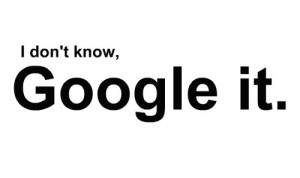 I have a mantra I like to repeat to myself over and over again. It goes something like this:
I have a mantra I like to repeat to myself over and over again. It goes something like this:
My favorite customers are the ones that care enough to offer feedback whether it be positive or negative.
That one, my friends, is easier said than done. That’s why it MUST be a mantra that you repeat daily.
I received one such piece of feedback from a customer that proved to be a particularly difficult pill to swallow. He said that he asked one of our agents a question about a product we sell and the agent responded saying, “I’m not sure. Give me a moment while I Google it.”
That’s a seemingly harmless reply, right? Never mind which agent said this to a customer because, if this is a big no no in customer service, I am perhaps the greatest offender!
I pressed our customer for a deeper explanation and he was so gracious to provide me with a few reasons why we shouldn’t tell a customer that we’re Googling for an answer. Here are a few deficiencies this response can indicate and potentially rattle the confidence of customers in your product and service.
1. Poor Training- Agents that have to Google for answers may indeed not be trained well enough to support your product or service.
2. Poor Support Organization- Why did the agent have to Google for an answer rather than asking tier two or consulting with internal documentation about the product?
3. Poor Product Support- If you are selling a product, you should be an expert in that product.
Now, before I throw customer service folks under the bus, let me go to bat for them for a moment. I applaud my team member who easily could have said “I don’t know” and told the customer to Google for the answer himself. I don’t expect our customer service staff to be encyclopedias of knowledge. In a growing and dynamic company, it is very difficult to maintain reams of factual knowledge. I do, however, expect them to be resourceful enough to efficiently find answers for customers.
Swinging back to the customer perspective, he contacted customer service because he didn’t have the answer. If finding the answer is as easy as Googling for it, why in the world did the customer take the time to call customer service in the first place?
So, the next time the customer asks you a question only Google knows the answer to, here’s the formula I suggest:
1. You can still Google for the answer- I applaud your resourcefulness.
2. Don’t tell the customer you’re Googling- Instead of saying “Let me do a Google search” simply say something like, “Let me locate the answer to your question” or “Let me consult with my supervisor to make sure I give you the most accurate answer.”
3. Write the answer down somewhere- If the customer points to an issue where training or documentation should be improved, send your supervisor a note and share what you learned with your coworkers.
In an age where limitless knowledge is available at our fingertips, keep in mind that it is available to your customers as well. Customer service professionals are experts in everything about your product or service but that doesn’t mean they won’t need to occasionally Google for an answer. That being said, the customer doesn’t need to know that we’re Googling for their answer — they simply need the correct answer in a timely manner.



